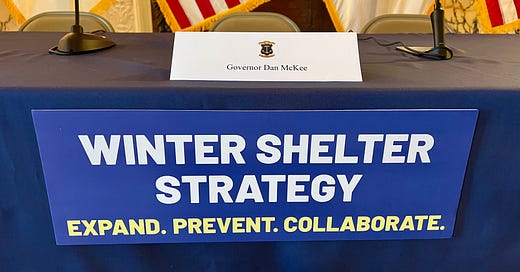Housing Secretary Pryor unveils Winter Shelter Strategy alongside efforts to prevent homelessness
"...we are optimistic that we will be able to meet the need," said Secretary Pryor.
Rhode Island’s Housing Secretary Stefan Pryor outlined the state’s Winter Shelter Strategy for the press on Friday, anchored around “prevention, expansion, and collaboration.” Last year, the Administration of Governor Daniel McKee downplayed the need for shelter beds and actively disputed the number of people in need of shelter. This led to the Governor activating the Rhode Island National Guard and opening a shelter in the Cranston Street Armory that was supposed to provide shelter for 60 people. Instead, the shelter held, on average, around 200 people a night, and served over 600 unique individuals experiencing homelessness over its months of operation.
This year Secretary Pryor seems determined to not repeat the mistakes of the past. I asked the Secretary if the state is prepared to shelter the estimated 1661 people who will be facing homelessness this winter, noting that homelessness has risen every year in the state since 2019.
Secretary Pryor did not dispute the estimate, saying “…we will be up in our shelter-based strength by hundreds. We will also be investing further in the kind of problem-solving and prevention that markedly, and in a very real way, impacts homelessness. And, for the first time in a way that's meaningful, we will be investing in these true emergency hubs where, when it's especially cold or there's a storm, Rhode Islanders experiencing homelessness and, indeed, all Rhode Islanders impacted by such cold weather or storm can go. Given all of that, we are optimistic that we will be able to meet the need.”
Moreover, added Secretary Pryor, “We are creating a pipeline by which we can create more [shelter beds] if we need to. We're simply not done yet.”
Specific components of the State’s Winter Shelter Strategy include, as outlined in the press release and the above video:
Expansion
Expanding shelter beds: To meet the growing need for shelter, the state is adding an additional 318 beds to the system beyond the number that existed last winter. This will represent a 30 percent increase in shelter capacity compared to levels last winter. Thanks to municipalities, service providers, and houses of worship that have answered the call to identify additional shelter sites throughout Rhode Island, there is the potential for up to a couple hundred additional beds in the pipeline. This would bring the potential number to over 500 beds more than last winter. Some of these additional beds may be utilized to replace more expensive beds in the system.
Deploying pallet shelters: In addition to adding shelter beds to the system, the State is also piloting new rapidly deployable shelters (pallet shelters) in Pawtucket or Providence. These sites would be available for 30-45 rapidly deployable, temporary shelter units. Experienced service providers such as House of Hope will partner to provide services to those piloting pallet shelters.
Creating emergency winter hubs: In addition to the shelter beds and pallet shelters, the Department of Housing is partnering with the Rhode Island Emergency Management Agency and local municipalities to open emergency winter hubs across Rhode Island. Next week, the Department of Housing will issue an RFP that would allow the Department to fund municipalities that opt to stand-up regional winter emergency hubs that are accessible and available overnight. The plan for emergency winter hubs is a more intentional approach to extreme weather than in previous years in which waiting rooms and public buildings were offered, some of which were not open when the weather was coldest. These regional hubs will be a resource for people experiencing homelessness as well as Rhode Islanders whose homes lose heat or power. Later today, the Department of Housing will be holding an informational session for municipalities on this topic.
Prevention
In addition to creating new shelter beds, it’s also important to prevent homelessness when possible. As part of its strategy, the State is utilizing initiatives to support individuals and families before they begin to experience homelessness. This includes:
Investing $750,000 in flexible financial assistance plus $1 million in counseling for housing problem solving to help Rhode Islanders experiencing homelessness rapidly exit their homelessness – often before a shelter stay is necessary. Housing problem-solving seeks to empower households to identify alternative housing options to avoid homelessness or to exit homelessness as quickly as possible. Rather than focusing on which programs a household might be eligible for or whether they are willing to enter shelter, housing problem-solving focuses on helping Rhode Islanders resolve the crisis they find themselves in. Sometimes this can mean reconnecting with friends or family, accessing mainstream benefits or supports, or accessing financial resources like application fees, first month’s rent, move-in supplies, or help with groceries. This initiative will aim to help more than 350 households prevent or end their homelessness. Specific awards are anticipated to be announced later this month.
Working with the Rhode Island Foundation to stand up a giving opportunity that would supplement the state’s investment in housing problem-solving and provide an opportunity for Rhode Island’s nonprofits, corporate citizens, and others wishing to make a donation to support this cause. We plan to share more information on that next week. The Housing Department hopes that Rhode Islanders will donate to support neighbors and friends struggling to stay in their homes.
Continuing financial support for legal services to prevent evictions through the work of Rhode Island Legal Services, the Center for Justice, Direct Action for Rights and Equality, and Housing Works RI. Through this program, any Rhode Islander who earns less than 80% of Area Median Income can access these services free of charge.
Naming Libby Kimzey to lead efforts to collaborate across State agencies via a new position based at the Department of Housing and in partnership with the Executive Office of Health and Human Services and the Department of Administration with a focus on addressing family homelessness.
Collaboration
A linchpin of the State’s winter shelter strategy is to involve municipal and faith leaders in assisting Rhode Islanders in need this winter. Specifically, faith leaders are calling upon houses of worship across the state to provide additional support this winter to support unsheltered Rhode Islanders. Faith leaders are working closely with the Department of Housing to identify possible properties for winter or temporary use. That collaboration has already yielded the expansion of Emanuel House in Providence by 41 beds as well as the preliminary identification of some sites for the emergency winter hub program.
In attendance at today’s news conference was Monsignor Albert Kenney of the Catholic Diocese, Bishop Nicholas Knisley of the Episcopal Diocese, Iman Abdul-latif Sackor of the Islamic Center of Rhode Island, Imam Mufti Ikram Haq of Masjid al-Islam and Rabbi Sarah Mack of Temple Beth-El.
Additionally, through the active involvement of the Rhode Island League of Cities and Towns, municipal leaders have been asked to identify locations for shelter and warming center bed expansion. That collaboration is yielding possibilities in potential locations such as Cumberland and Coventry. Jordan Day, Associate Director of the Rhode Island League of Cities and Towns, attended today's announcement.
Crossroads Rhode Island CEO Karen Santilli issued the following statement in support of the Winter Shelter Strategy:
“Crossroads is ready to support the state to ensure that individuals and families have access to safe shelter this winter. We continue to operate expanded emergency shelters and our housing problem-solving team remains fully committed to helping connect individuals and families experiencing homelessness with the support they need to find housing.
"While the state is taking the right short-term steps to build and create shelter capacity ahead of the winter season, state leaders and advocates alike must redouble their support for meaningful investments for the development of permanent supportive housing so we can soon see a day when this annual press conference is no longer necessary.”





